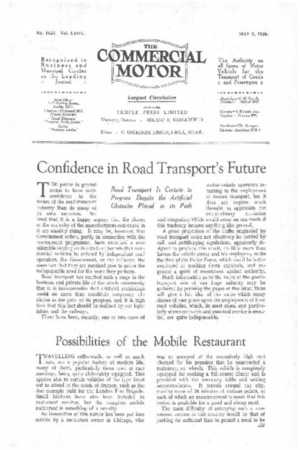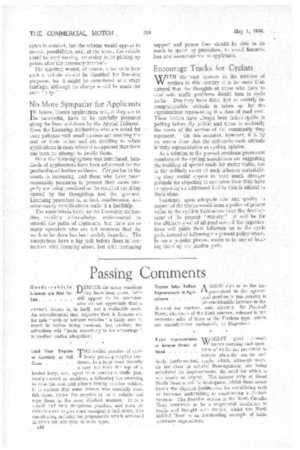Possibilities of the Mobile Restaurant
Page 71

Page 72

If you've noticed an error in this article please click here to report it so we can fix it.
"TRAVELLING coffee-stalls, as well as snack 1 bars, are a popular feature of modern life, many of them, particularly those used at race meetings, being quite elaborately equipped. This applies also to certain vehicles of the type fitted out to attend to the needs of firemen, such as the fine example built for the London Fire Brigade. Small kitchens have also been included in restaurant coaches, but the complete mobile restaurant is something of a novelty.
An innovation of this nature has been put into service by a restaurant owner in Chicago, who was so annoyed at the excessively high rent charged for his premises that he constructed a restaurant on wheels. This vehicle is completely equipped for cooking a full-course dinner and is provided with the necessary table and seating accommodation. It travels around the city, making stops of 20 minutes at various points, at each of which an announcement is made that this period is available for a good and cheap meal.
The main difficulty of arranging such a convenient service in this country would be that of parking for sufficient time to permit a meal to be eaten in comfort, but the scheme would appear to present possibilities, and, at the worst, the vehicle could be kept moving, returning to its picking-up points after the necessary intervals.
The question would, of course, arise as to how such a vehicle should be classified for licensing purposes, for it might be considered as a stage carriage, although no charge would be made for each " trip."
No More Sympathy for Applicants
IN future, licence applications will, if they are to be successful, have to be carefully prepared along the lines laid down by the Appeal Tribunal. Even the Licensing. Authorities who are noted for their patience with small carriers are reaching the end of their tether and are deciding to refuse applications in cases where it is apparent that there has been no attempt to justify them.
Since the licensing system was introduced, hundreds of applications have been adjourned for the production of further evidence. Congestion in the courts is increasing, and those who have taken reasonable measures to present their cases properly are being penalized as the result of the delay caused by the thoughtless and the ignorant. Licensing procedure is, at best, cumbersome, and unnecessary complications make it a hardship.
The associations have, as the Licensing Authorities publicly acknowledge, endeavoured to smooth the paths of applicants, but there are so many, operators who are not members that the work so far done has been unduly impeded. The associations have a big task before them in connection with licensing alone, but with increasing support and power they should be able to do much to speed up procedure, to avoid financial loss and inconvenience to applicants.
Encourage Tracks for Cyclists
WITH the vast increase in the number of cyclists in this country it is no more than natural that the thoughts of those who have to deal with traffic problems should turn to cycle paths. This they have done, but an entirely incomprehensible attitude is taken up by the organizations representing this class of road user. These bodies have always been indefatigable in putting before fir public and those in authority the views of the section of the community they represent. On this occasion, however, it is by no means clear that the anti-cycle-track attitude is truly representative of cycling Opinion.
As a solution to the present problems prominent members of the cycling associations are suggesting the building of special roads for motor traffic, but in the unlikely event of such schemes materializing they would appear to have much stronger grounds for objecting to exclusion than they have in opposing an additional facility that is offered to them alone.
Insistence upon adequate size and quality in respect of the tracks would seem a policy of greater value to the cyclists themselves than the development of the present "war-cry." It will be for the ultimate good of all road-users if the organizations will guide their followers on to the cycle path, instead of following the present policy which, to use a popular phrase, seems to be one of leading them up the garden path.








































































































































































